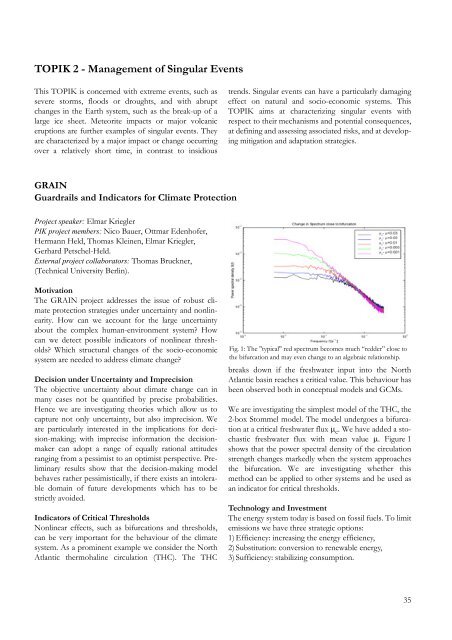PIK Biennial Report 2000-2001 - Potsdam Institute for Climate ...
PIK Biennial Report 2000-2001 - Potsdam Institute for Climate ...
PIK Biennial Report 2000-2001 - Potsdam Institute for Climate ...
You also want an ePaper? Increase the reach of your titles
YUMPU automatically turns print PDFs into web optimized ePapers that Google loves.
TO<strong>PIK</strong> 2 - Management of Singular Events<br />
This TO<strong>PIK</strong> is concerned with extreme events, such as<br />
severe storms, floods or droughts, and with abrupt<br />
changes in the Earth system, such as the break-up of a<br />
large ice sheet. Meteorite impacts or major volcanic<br />
eruptions are further examples of singular events. They<br />
are characterized by a major impact or change occurring<br />
over a relatively short time, in contrast to insidious<br />
GRAIN<br />
Guardrails and Indicators <strong>for</strong> <strong>Climate</strong> Protection<br />
Project speaker: Elmar Kriegler<br />
<strong>PIK</strong> project members: Nico Bauer, Ottmar Edenhofer,<br />
Hermann Held, Thomas Kleinen, Elmar Kriegler,<br />
Gerhard Petschel-Held.<br />
External project collaborators: Thomas Bruckner,<br />
(Technical University Berlin).<br />
Motivation<br />
The GRAIN project addresses the issue of robust climate<br />
protection strategies under uncertainty and nonlinearity.<br />
How can we account <strong>for</strong> the large uncertainty<br />
about the complex human-environment system? How<br />
can we detect possible indicators of nonlinear thresholds?<br />
Which structural changes of the socio-economic<br />
system are needed to address climate change?<br />
Decision under Uncertainty and Imprecision<br />
The objective uncertainty about climate change can in<br />
many cases not be quantified by precise probabilities.<br />
Hence we are investigating theories which allow us to<br />
capture not only uncertainty, but also imprecision. We<br />
are particularly interested in the implications <strong>for</strong> decision-making;<br />
with imprecise in<strong>for</strong>mation the decisionmaker<br />
can adopt a range of equally rational attitudes<br />
ranging from a pessimist to an optimist perspective. Preliminary<br />
results show that the decision-making model<br />
behaves rather pessimistically, if there exists an intolerable<br />
domain of future developments which has to be<br />
strictly avoided.<br />
Indicators of Critical Thresholds<br />
Nonlinear effects, such as bifurcations and thresholds,<br />
can be very important <strong>for</strong> the behaviour of the climate<br />
system. As a prominent example we consider the North<br />
Atlantic thermohaline circulation (THC). The THC<br />
trends. Singular events can have a particularly damaging<br />
effect on natural and socio-economic systems. This<br />
TO<strong>PIK</strong> aims at characterizing singular events with<br />
respect to their mechanisms and potential consequences,<br />
at defining and assessing associated risks, and at developing<br />
mitigation and adaptation strategies.<br />
Fig. 1: The "typical" red spectrum becomes much “redder” close to<br />
the bifurcation and may even change to an algebraic relationship.<br />
breaks down if the freshwater input into the North<br />
Atlantic basin reaches a critical value. This behaviour has<br />
been observed both in conceptual models and GCMs.<br />
We are investigating the simplest model of the THC, the<br />
2-box Stommel model. The model undergoes a bifurcation<br />
at a critical freshwater flux � c. We have added a stochastic<br />
freshwater flux with mean value �. Figure 1<br />
shows that the power spectral density of the circulation<br />
strength changes markedly when the system approaches<br />
the bifurcation. We are investigating whether this<br />
method can be applied to other systems and be used as<br />
an indicator <strong>for</strong> critical thresholds.<br />
Technology and Investment<br />
The energy system today is based on fossil fuels. To limit<br />
emissions we have three strategic options:<br />
1) Efficiency: increasing the energy efficiency,<br />
2) Substitution: conversion to renewable energy,<br />
3) Sufficiency: stabilizing consumption.<br />
35

















